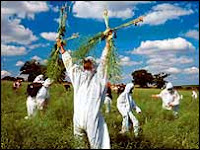I got an interesting comment on my article posted sometime ago: http://malaysia4biotech.blogspot.com/2008/07/conventional-breeding-vs-genetic.html.
I started responding to the comment and it got too long, that I decided to post it as an article. Here is my response:
We have to first understand that there is nothing such as absolute safety. But what we can safely say is that in spite of many anti GMO claims, GM crops present not new or different risks. National Academies, Royal Societies and Scientific Societies around the globe have reviewed the underlying science and all have come to the same conclusion. The technology is more precise and better defined than conventional plant breeding and it produces fewer and smaller genetic changes. When regulators in the EU or Australia or Japan approve a new GM crop, they do it with the certainty that it is as safe as any other crop. Determined anti GM activists have spread all sorts of fears about the technology but the scientific community believes that when newly developed GM products are approved by regulators the world over, they are the best studied and safest crops we have ever planted.
There is an extensive scientific literature on safety studies and thousands of papers about safety of specific crops. None of these reveal any flaws in the case-by-case assessment process. Those kinds of studies have been independently done and published. When anti GM activists have no answer for the facts the only thing they can do is try to impeach the source in the hope that listeners will believe them without consulting the literature.
There is more research on GM crops being done in the public sector and in developing countries than there is in the private sector. Big companies have given their technology free of charge to projects designed to help the poor and hungry. People who run misinformation campaigns know that it is always a good idea to give the audience a villain to hate. Many of the arguments against biotech companies are simply anti-globalization and anti-capitalist arguments. It would be better if this debate were held on the merits of globalization and capitalism rather than through a back door attack on a surrogate produced by companies—in this case, GM crops. Personally, I find things produced by giant companies very useful. They produced my computer, my car, the food I eat, the clothes I wear, the communication systems I use, and the energy that cools and powers my house. To those all anti-industry individuals out there, I say – please stop using any products produced by the industry...
I agree completely that it depends on who one listens to and who one believes. One should be very careful in choosing who to believe. In this debate there are giant companies trying to sell products but there are also anti-GM activists whose livelihood comes from continual campaigns against this and other technologies. I have chosen to believe the consensus of the scientific literature. In this case there are numerous peer-reviewed papers that document large reductions in chemical use associated with a switch to GM crops (see Brooks and Barfoot, Pray et al. etc). Given the staggering amount of evidence on this topic it is amazing that those who oppose the technology still go on spreading junk science, oblivious to all the scientific evidence.
That is also another fallacy generated by opponents of GM crops. Saying something again and again doesn’t make it true. FAO says there is not only not enough food in the world to feed the world population and that the situation is getting worse by the day. Food reserves have fallen to all time low and food prices are near all time high. In spite of the Millennium Goals, the number of hungry is going up not down.
Risk analysis is a comparative process in which we analyze one product or process against another. When we compare GM crops with conventional crops we conclude they are actually safer. That’s a scientific risk assessment. It does not mean that conventionally bred crops are unsafe—not at all, we eat them every day and know that they are safe. It does mean that GM crops are no more risky and are usually less risky than conventional foods. There are no villains, monsters or heroes here. Just foods that is as safe as others. The point being made is simply that there is more uncertainty with conventional crops than GM crops, more changes in the DNA could have taken place, composition could have changed more dramatically, and there is a greater risk of producing toxicants or allergens by conventional breeding than there is with GM crops. But none of this means conventional crops are any less safe than we know them to be—it is merely a good way of putting GM crops in the proper perspective to compare their safety with that of conventional crops.
By Mahaletchumy Arujanan



No comments:
Post a Comment